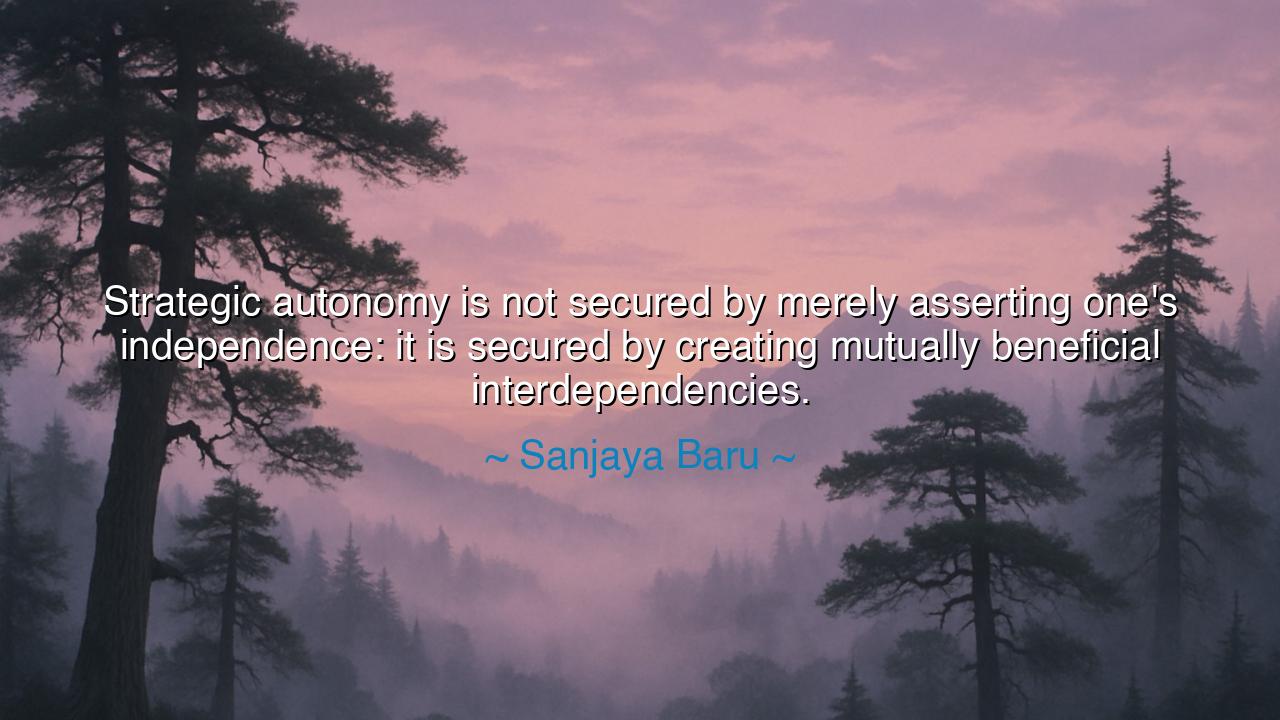
Strategic autonomy is not secured by merely asserting one's
Strategic autonomy is not secured by merely asserting one's independence: it is secured by creating mutually beneficial interdependencies.






The words of Sanjaya Baru, spoken with the clarity of a strategist and the wisdom of a philosopher, carry the weight of deep understanding about the balance of power and cooperation in our world. When he said, “Strategic autonomy is not secured by merely asserting one’s independence: it is secured by creating mutually beneficial interdependencies,” he was teaching a truth that transcends the language of geopolitics. His words remind us that no nation, no person, can stand alone in an interconnected world—that true strength does not lie in isolation, but in the weaving of relationships that protect, uplift, and sustain all. To the unwise, independence may seem the highest virtue, but to the enlightened, interdependence is the deeper and more enduring path.
To understand the origin of this quote, one must look to the context in which Sanjaya Baru, a noted Indian economist and political advisor, spoke. His words arose in the arena of global diplomacy, where nations struggle to balance sovereignty with cooperation. In the modern age—an age of shared economies, technologies, and challenges—the old ideal of total independence has become an illusion. Nations are bound together by trade, by climate, by security, and by the invisible threads of information and innovation. Baru’s insight speaks to the heart of this reality: that strategic autonomy, whether for a country or an individual, is not the absence of dependence, but the art of choosing the right kinds of dependence. It is the wisdom to build relationships that empower rather than weaken, that create mutual benefit rather than subjugation.
His words echo the ancient philosophy of balance that has guided wise rulers through the centuries. In the East, the sages taught that harmony, not dominance, is the highest form of mastery. In the Arthashastra, the great Indian strategist Chanakya advised his king that alliances, trade, and diplomacy were as vital as armies, for no kingdom could prosper alone. Likewise, in the West, Thucydides chronicled the rise and fall of empires that failed to understand this truth: those who sought power through isolation fell, while those who forged enduring partnerships thrived. Baru’s quote, then, is the modern echo of this ancient wisdom—an affirmation that strength, like life itself, flows through connection.
Consider the story of post-war Europe, ravaged by decades of conflict. The nations that had once fought to destroy one another came together to form the European Union, binding themselves through economic cooperation. They learned that peace is not the fruit of separation but of interdependence—that when nations share their prosperity, they also share their security. What was once the most war-torn region of the world became a bastion of stability and mutual growth. Here, Baru’s truth comes alive: strategic autonomy did not mean cutting ties; it meant creating ties strong enough to ensure that no one would wish to break them.
In the tone of the ancients, we may say: to be truly independent, one must learn to depend wisely. A mountain stands alone, but it is lifeless. A forest, filled with trees that share sunlight, soil, and water, thrives. So too with nations, and with people. The arrogant mind says, “I need no one,” and finds itself weak when storms arise. The wise say, “Let us stand together,” and in their shared strength, they find endurance. Baru’s insight pierces the illusion that independence is merely a declaration; it is, rather, a discipline—a constant shaping of alliances, a careful tending of bonds that ensure stability even in times of chaos.
Yet his words carry a warning as well. Interdependence must be mutual. To depend blindly is to risk subjugation; to depend wisely is to shape partnerships that honor equality and respect. A nation that allows itself to be exploited in the name of cooperation loses not only its autonomy but its dignity. The art of strategic autonomy lies in balance: in being open without being overpowered, in being connected without being consumed. It is the same for individuals, who must cultivate relationships that empower rather than enslave, that challenge rather than drain.
The lesson of Baru’s words, therefore, is both practical and profound. True autonomy—whether of a nation, a company, or a soul—is not a fortress of isolation but a network of trust. The most enduring power is built through the harmony of shared interests, through the wisdom of collaboration. In the modern age, survival itself depends on such interdependence—between nations in peace, between communities in justice, between human beings and the Earth that sustains them.
And so, the practical path is this: do not seek freedom in solitude, but in connection. Build relationships rooted in fairness and respect. Let your independence be strengthened, not diminished, by cooperation. For as Sanjaya Baru reminds us, the greatest strength does not come from standing alone against the world—but from standing together with it, bound by purpose, guided by wisdom, and sustained by the shared promise of a future built on mutually beneficial interdependence.






AAdministratorAdministrator
Welcome, honored guests. Please leave a comment, we will respond soon